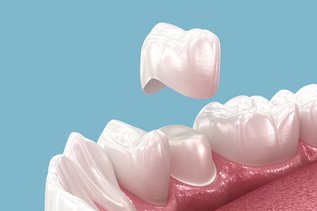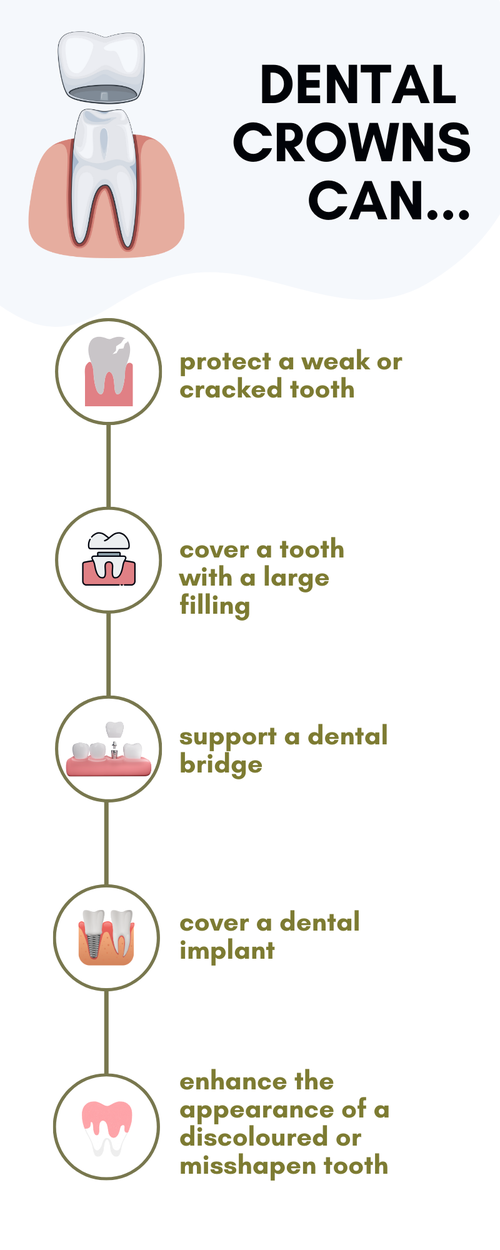
Dental Crowns: What to Expect Before, During, and After
Key Takeaways
- Dental crowns are covers for damaged or discoloured teeth. They are an effective solution for multiple oral health issues in which teeth are damaged or lost.
- Different materials can be used to make tooth crowns. Each material possesses unique properties. The choice of material is based on its benefits for the tooth's location and the patient’s preferences.
- You can prolong the life of the crown for long-term benefits with good and consistent oral habits and maintenance.
- North York Smile Centre provides expert dental care and high-quality, customized crowns for each patient's needs.
Dental crowns are a dental restoration treatment. They are used to protect and enhance the appearance of damaged teeth, for better aesthetics, and long-term dental function. Here’s what you need to know about dental crowns—before, during, and after the procedure.
What are Dental Crowns?
Dental crowns are installed over the affected tooth, as caps or covers. A crown helps a tooth regain shape, size, strength, and appearance. Your dentist may recommend a dental crown when a tooth is too damaged to be filled or when you want to improve your smile.
Types of Crowns based on materials
There are different types of crowns available, based on the material used to make them.
- Porcelain or ceramic crowns imitate the colour and translucence of natural teeth and give a natural appearance to your teeth. This makes them perfect for front teeth.
- Metal crowns are made of gold or other metal alloys. Metal's durability and wear-resistance makes metal crowns suitable for back teeth or molars.
- If you are looking for the combined benefits of porcelain and metal crowns, porcelain-fused-to-metal crowns fit the bill. They combine the durability of metal with the aesthetic appeal of porcelain.
- Resin crowns: Resin crowns are not as durable, hence, they are typically used as a temporary solution.
Factors that determine the choice of dental crown material include:
- Aesthetic preferences: Front teeth often require more natural-looking materials like porcelain.
- Location of the tooth: Molars benefit from stronger materials, like metal to handle the force exerted in chewing and grinding.
- Durability needs: Patients who suffer from teeth grinding or bruxism need crowns that can tolerate high pressure.

Why you might need a Dental Crown
Dental crowns are used to:
- protect a weak or cracked tooth: Crowns prevent further damage and restore the function of the tooth.
- restore a broken or severely worn-down tooth: A dental crown helps to regain the tooth’s original shape and strength.
- cover a tooth with a large filling: Crowns offer extra support when the natural structure can’t.
- support a dental bridge: A crown can act as an anchor for bridge placement.
- cover a dental implant: Crowns are the final step in implant restoration.
- enhance the appearance of a discoloured or misshapen tooth: Crowns improve the appearance of your teeth and smile.
What to expect before getting a Dental Crown
Initial Consultation
Your dentist will assess your oral health and discuss whether a crown on a tooth is the best option. Your dentist may use X-rays and advanced imaging to examine the condition of the tooth and the health of the tooth’s root.
Tooth Preparation
The dentist will remove some enamel to make space for the crown. This step may involve a temporary crown for protection during the fabrication process.
The Procedure: What happens during Crown Placement
Step 1: Preparing the tooth
After numbing the area, the dentist reshapes the tooth by removing decayed or damaged material. A smooth base allows the crown to fit securely.
Step 2: Taking impressions
Advanced imaging of your tooth ensures a custom fit. The digital scans are sent to a dental lab for fabrication.
Step 3: Crown Fabrication
The lab creates a crown to match your tooth’s dimensions and aesthetic needs.
Step 4: Final Placement
Once the permanent crown is ready, it’s cemented onto the prepared tooth. The dentist checks for proper fit, alignment, and bite. Any necessary adjustments can be made.
What to expect after getting a Dental Crown
Immediate Aftercare
After the dental crown procedure, you may experience:
- Slight sensitivity to hot or cold foods which typically goes away within a few days.
- Minor discomfort can be easily managed with over-the-counter pain relief medication.
Avoid hard foods. Do not use the crowned tooth for biting or chewing immediately after placement to allow the crown to set fully.

Long-Term Care
To maintain your crown:
- Brush and floss regularly to prevent plaque buildup around the crown.
- Avoid hard or sticky foods to reduce the risk of dislodging or damaging the crown.
- Schedule regular dental check-ups to make sure the crown is in good condition and to address any issues early.
How durable are Dental Crowns?
Factors Affecting Durability
The longevity of a dental crown depends on:
- Material used: For example, metal crowns tend to last longer than resin.
- Oral hygiene practices: Good oral hygiene can prevent decay around the crown.
- Lifestyle habits: Avoiding teeth grinding and excessive sugar intake improves the life of your crown.
Tips for Maximizing Durability
- Wear a night guard if you grind your teeth while sleeping.
- Maintain a balanced diet rich in calcium and avoid acidic foods.
- Visit your dentist regularly for professional dental cleanings and checkups.
Regular Professional Cleanings
Routine dental visits are essential to ensure the crown remains in good condition and to address any potential issues early.
Dental Crowns vs. Other Restorative Options
Crowns vs. Veneers
Veneers cover only the front surface of the tooth, making them a cosmetic solution for minor imperfections. Crowns cover the entire tooth and are better suited for severe damage.
Crowns vs. Dental Fillings
Fillings repair small cavities and damage, while crowns are used for more extensive restoration. Crowns offer added strength and protection for weakened teeth.
Crowns vs. Implants
Crowns restore existing teeth but implants replace missing teeth entirely. Implants are a more comprehensive solution for tooth loss, acting as foundation for a crown.

Dental Crowns at North York Smile Centre
North York Smile Centre offers high-quality crowns for teeth made with durable materials. Our experienced team ensures a comfortable and seamless experience from start to finish. Dr. Jerry Jesin notes: “Dental crowns provide both functional and aesthetic benefits, helping patients regain confidence in their smiles.”
FAQs
Q: What is a dental crown?
A: A dental crown is a cap placed over a damaged tooth to restore its shape, strength, and appearance.
Q: Does getting a crown hurt?
A: The procedure is performed under local anaesthesia, making it painless. Some mild discomfort may occur afterward.
Q: How long do crowns last?
A: Crowns typically last 10-15 years or longer with proper care.
Q: Tooth crown before and after — what changes can I expect?
A: A crown can significantly improve the appearance and functionality of a damaged tooth, restoring your smile.
For more information or to schedule a consultation, visit North York Smile Centre or call 416-800-1581.

